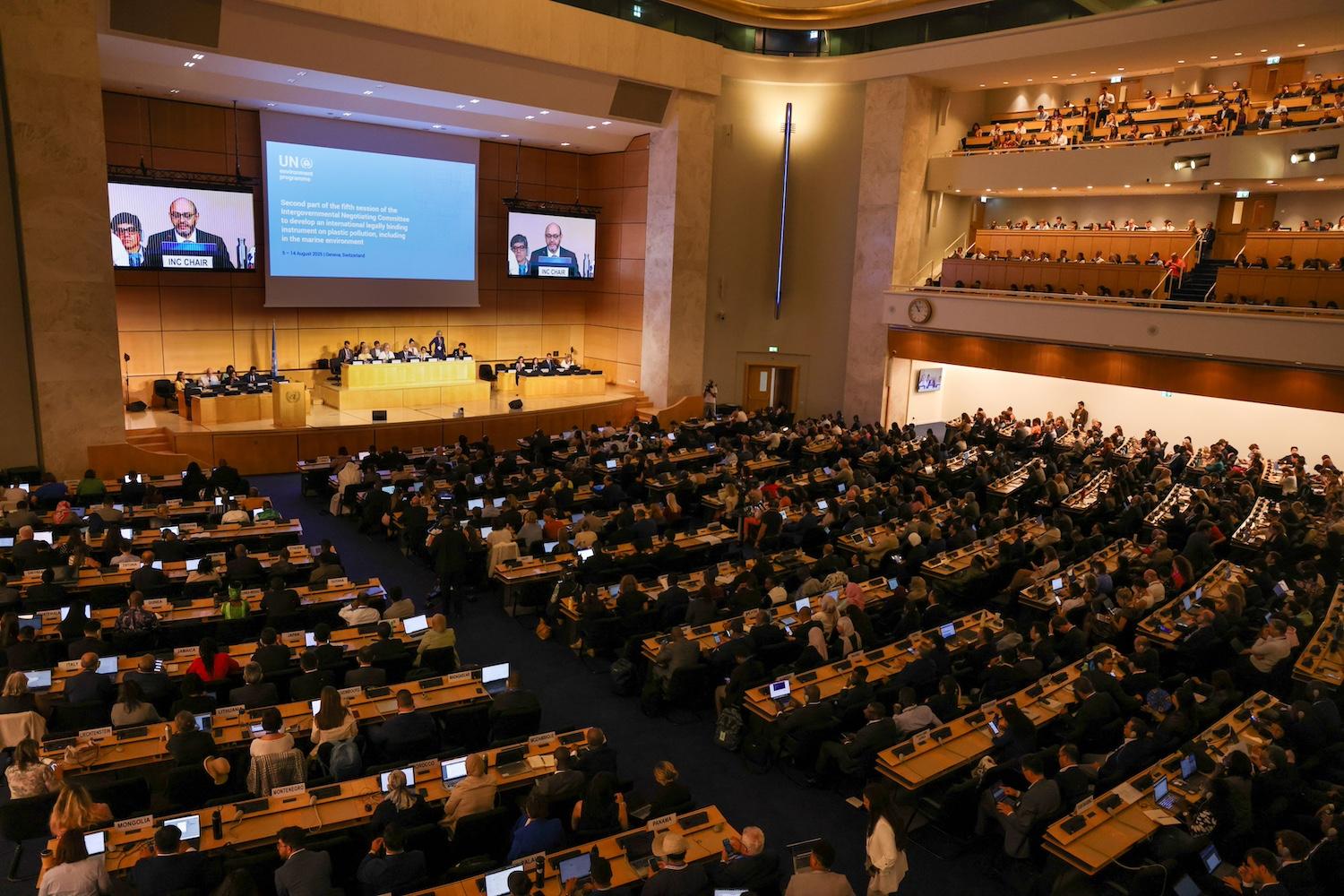
The opening session of the most-recent negotiations for a global plastic pollution treaty in Geneva, Switzerland, on August 5, 2025. (Image: United Nations Environment Program)
The latest round of negotiations for a global treaty to address plastic pollution is underway in Geneva, Switzerland. The talks began on August 5 with an atmosphere of hope. Luis Vayas Valdivieso, chair of the Intergovernmental Negotiating Committee tasked with creating the global treaty, opened the formal proceedings with encouraging words to set the tone.
“The problem is real. The evidence is clear. We are pretty sure nobody wants plastic pollution, but we have not yet found a systematic way to stop it,” he said. “It is a human-made crisis, so it must be solved by humans and global cooperation. This moment demands real progress, not finger-pointing … The world awaits special news from Geneva. They are looking to us with hope. Let us look to August 14 not as a deadline but as a day of achievement.”
The tone changed by Saturday when Valdivieso summed up the status with: “The progress made has not been sufficient. We have arrived at a critical stage where a real push to achieve our common goal is needed.”
The state of play at the talks for a global plastics treaty
Reducing the production of plastic was the elephant in the room from the very first day of the treaty talks. Environmental interests are unified in the belief that the ultimate solution is to turn off the flow of plastic at the top of the supply chain. Russia, Iran, Saudi Arabia, and other oil-producing and Gulf states have steadfastly worked to block language about reducing plastic production since the first negotiations began in November 2022.
Even before the talks started, Reuters reported that the United States sent a letter to an undetermined number of countries that read, "We will not support impractical global approaches such as plastic production targets or bans and restrictions on plastic additives or plastic products — that will increase the costs of all plastic products that are used throughout our daily lives.”
In the past, the U.S. played the role of neutral intermediary. For a brief period last year, it joined in supporting some of the more restrictive measures backed by nearly 100 other countries, including caps on plastic production and removing plastic additives that might be harmful to human health or the environment.
Clouds were already forming on the horizon when speakers put forth their views during a forum the day before the formal negotiations began. Raelene Martin, head of sustainability for the International Chamber of Commerce, repeated the standard message from industry — that the answer to plastic pollution is rooted in a circular economy, where the elements necessary to advance recycling are emphasized and financed. These include universal design standards and regulations across nations.
Later in the week, Yoni Shiran, a partner and the plastics lead at the sustainable economic systems company SYSTEMIQ, announced the results of a new report funded by the Ellen MacArthur Foundation and the Business Coalition for a Global Plastics Treaty. The study concluded that a treaty with “globally harmonized obligations and criteria to phase out the most problematic plastic products could help us eliminate more than twice as many problematic and avoidable plastic products (compared to a treaty based on voluntary national measures)."
With the right regulations, the study projected a 77 percent increase in the recyclability and reusability of plastic products globally, Shiran said. While this sounds impressive and is a commendable step forward, the global plastic recycling rate is approximately 9 percent today — which means a 77 percent increase in recyclability would only add up to about 16 percent of plastics being recycled around the world.
Last week's negotiating sessions also saw the release of a new report on the impacts of plastic on human health. Published in The Lancet, one of the world's most respected medical journals, the study linked plastics to disease and death in humans of all ages — causing an estimated $1.5 trillion in health-related economic losses annually. Ingesting or inhaling tiny pieces of plastic (called microplastics and nanoplastics), or being exposed to plastic-related chemicals, can all cause health problems. The impacts fall disproportionately on low-income and already at-risk populations, and accelerating growth in plastic production is the principal driver, the global research team behind the study found.
Where the conversation stands
Outside of the main chamber, member states deliberated in four groups last week. Each group was assigned a section of the treaty draft and tasked with bringing language, if agreed upon, to the full plenary on Saturday. Informal discussions closed to public view were also regularly held between the small group meetings in hopes that delegates would have more candid conversations in private to move them closer to an agreement. Still, each group reported inadequate progress.
The critical problem is that the treaty must be approved by consensus, meaning all countries must agree to the language and a single country can stop the approval. Environmental groups reacted strongly as disagreement stalled progress over the weekend.
“Consensus is clearly holding us back from reaching agreement, yet still countries did not have the courage to take action," Salisa Traipipitsiriwat of Environmental Justice Foundation Thailand said in a statement on Saturday. "The ambitious majority of countries that have committed to achieving a strong treaty cannot keep sitting back and expecting that the current process — of achieving consensus at all costs — will have any worthwhile outcome," Zaynab Sadan, WWF’s global plastics policy lead, said in another.
Some advocates called for the language approved by the majority of countries to be put to a vote without waiting for consensus. But even if that happened and the treaty was approved by majority vote, the countries that objected to the final text would likely not abide by it, leaving trade sanctions between countries as the only real remaining option for international enforcement.
Today, many in that ambitious majority of countries rejected the most recently proposed language, which excludes caps on plastic production and limiting the chemicals used in plastics.
"Our redlines and redlines of the majority of countries represented in this room were not only stomped, they were spat on and they were burned," Juan Carlos Monterrey Gomez, head of the Panama delegation, said during the session. "This is repulsive. It is not ambition, it is surrender, and we will not sell out future generations for a text as weak as this.”
Discussions are to continue until treaty language is set to be finalized on Thursday. If no agreement is reached, it is unclear whether another series of negotiations will be scheduled or if the treaty effort will be abandoned. One alternate scenario suggests a separate coalition of countries willing to commit to regulations like production cuts might join together and craft agreements with each other if the treaty process fails or is insufficient to meet the desires of those countries.

Carl Nettleton is an acclaimed award-winning writer, speaker and analyst. He heads Nettleton Strategies, a public policy firm specializing in oceans, water, energy, climate, and U.S. Mexico border issues. Carl also founded OpenOceans Global, an NGO solving ocean crises by unifying and empowering global communities. Carl serves on the national and California advisory councils for Environmental Entrepreneurs (E2), a national, nonpartisan group of business owners, investors and others who advocate for policies that are good for the economy and good for the environment. He is co-chair of the San Diego Water Conservation Action Committee (CAC) and a member of the San Diego Regional Chamber of Commerce, Lambda Alpha, South County Economic Development Council, Otay Mesa Chamber of Commerce and U.S.-Mexico Border Philanthropy Partnership.














